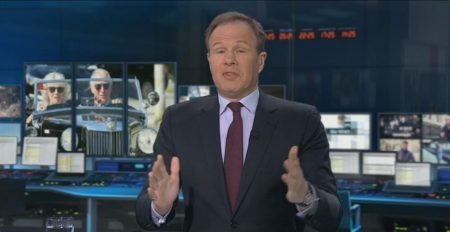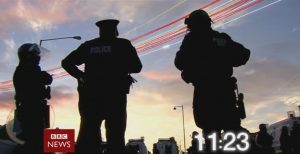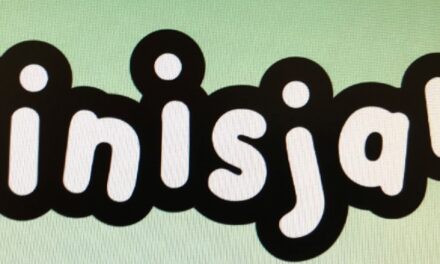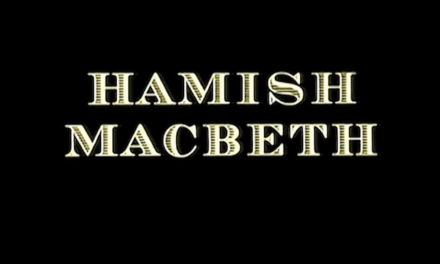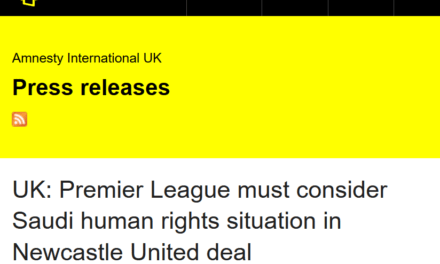ITV News at Ten, Wednesday 26 March, 24 minutes into the bulletin: Tom Bradby, the senior presenter, suddenly starts giggling. He has already handled the transition from a story about the Pope withdrawing his hand when the faithful tried to kiss his ring by saying, with a shrug:
“There are some very strange stories on the bulletin tonight” (25’56”)
The immediate cause is a PR quote he has had to read about Prince Charles driving a vintage MG in Cuba:
“Prince Charles enjoyed the drive but didn’t quite manage to get into top gear”. (26’00)
He giggles, says “sorry that’s not funny” and continues to the next item:
“the extensively trailed first all women space walk was scheduled for this Friday March 29, but now their first exit into space has been cancelled – it’s catching – The two women astronauts both need a medium suit not a large, and there’s only one on the space station”.
By this end of this, he can no longer contain his laughter. Fortunately, the item itself is narrated by a reporter which gives him time to recover a degree of control.
It is the reference to Brexit which triggers the second laugh: 29 March was the date on which, until very recently, the UK was to leave the EU. But now it is cancelled, or at least postponed (which of these may have been decided by the time this blog is published…. Or not).
Bradby’s laughter made me think about the differences between the editorial approaches of ITV and BBC news. It is impossible to think of Huw Edwards laughing whilst reading the news, or even, these days, cracking a smile. Brexit pervades the news. Bradby’s comment that there are some very strange stories (and an earlier comment on the Jussie Smollett story “that’s a story that makes absolutely no sense on any level” 15’40”) relate to predominant sense of bemusement (if not panic) at day-to-day events surround the issue.
ITV News’s editorial style is diverging from that of the BBC. Since the ITV News relaunch in 2015, Bradby has fronted a more relaxed editorial style which, as the British political crisis has deepened, has become even more markedly different from that of the BBC’s main evening news, even though they occupy the same 10pm slot on a main mass channel.
ITV’s approach can be summarised as that of the bemused outsider: if you’re puzzled by what’s going on, then so are we. It is an approach that plays well to an audience divided by Brexit but increasingly united in feeling shut out of the ever more bizarre events surrounding the gradual collapse of the Teresa May minority government.
Britain is undergoing a political crisis brought about by one issue, Brexit, rather than the multiple other domestic scandals that, once upon a time, would have been enough to sink such a regime: Grenfell Tower, Windrush generation, knife crime, increasing homelessness, Chris Grayling, prison and probation crises, the failure of the outsourcing giant Carillion, Chris Grayling, the NHS on the brink of collapse, multiple failures in the benefits system. None of these has caused anything like a crisis. It is Brexit and the prime minister’s handling of it alone which has brought the British political system into the profound constitutional crisis which is now still unfolding.
So how should a TV news service handle the issue? It is not simply a matter of balance, though that is a contributory factor to the problems of the BBC. It is a matter of editorial tone. The editorial tones of BBC and ITV are very different.
The BBC’s tone is summarised by its pervasive graphic, based on the idea of a countdown.
Electronic news is collected around the world by their dedicated journalists and streamed back to Broadcasting House where it is all processed:
This places the BBC at the heart of information gathering and processing. The narrative of this sequence sets up the expectation that the resulting news will be made up of material from the inside of events, but put together within an authoritative frame. There’s no space here for Bradby’s levity, nor even for the slightest of relationship building with the consumers of the news bulletins. The BBC tells us the news. In so doing, the BBC tells us what the priorities are within the news.
This approach has created huge problems in dealing with the divisive and confusing issue of Brexit. The choice of story elements has to be evenly balanced between one side and another. There is no space to explore the issue of the mendacity and sharp practice that underlay the campaign to leave the EU: the issue painstakingly exposed by Carole Cadwalladr in the Observer, conducting the kind of investigation that once would have fallen in the scope of the old hour-long Panorama or ITV’s World in Action*. But that kind of television current affairs has atrophied, migrating in part to the longer-form news bulletins. But just like the long distance migration of birds, there have been considerable losses on the way. The capacity of TV journalism to ‘speak truth to power’ has been one. Instead of investigating the mysterious source of Arron Banks’ funding for the leave campaign, hapless reporters are sent to the market places and pubs of Brexit-voting towns to gather vox pops.
The one area where BBC news can explain and question to some degree is in the specialist correspondents: Laura Kuenssberg, John Peinaar, Katya Adler, whose rather thankless task is to relay gossip and guess what will happen a few days or hours into the future. Kuenssberg in particular has been viciously attacked by both left and right, showing that she, at least, can chart some kind of a course between the opposing sides of the argument (whatever the argument is at the time).
But the editorial stance of the BBC news as a whole is singularly unfortunate. It sets itself up as an authoritative source where no such authority is possible. There are many possible ways out of a crisis that has been created by a failure of governance on a grand scale. But it is impossible for the BBC to articulate this failure with any clarity. To identify the failure is an act of taking sides. They have to continue with the pretence that the actual prime minister is an effective occupant of the position of prime minister. This is increasingly not the case, as parliament’s act of taking back control of the Brexit process has proved. ITV’s more modest editorial stance, starting from the position of many of its viewers, is a more productive one in these confusing times. Bradby’s slightly hysterical moment is a vivid testimony to the depth of the crisis in a way that the increasingly hangdog look of Huw Edwards is not.
John Ellis is Professor of Media Arts at Royal Holloway University of London. He leads the ADAPT project on the history of technologies in TV, funded by a €1.6 million grant from the European Research Council. He is the author of Documentary: Witness and Self-revelation (Routledge 2011), TV FAQ (IB Tauris 2007), Seeing Things (IB Tauris 2000) and Visible Fictions (1984). Between 1982 and 1999 he was an independent producer of TV documentaries through Large Door Productions, working for Channel 4 and BBC. He is chair of Learning on Screen and also oversees the Royal Holloway team working on EUscreen. His publications can be found HERE.
Footnotes & References:
* Peter Goddard, John Corner and Kay Richardson (2001), ‘The formation of World in Action: A case study in the history of current affairs journalism’, Journalism, 2(1): 73–90. doi: 10.1177/146488490100200109
Peter Goddard, John Corner and Kay Richardson (2007), Public Issue Television: World in Action 1963–98, Manchester: Manchester University Press.


